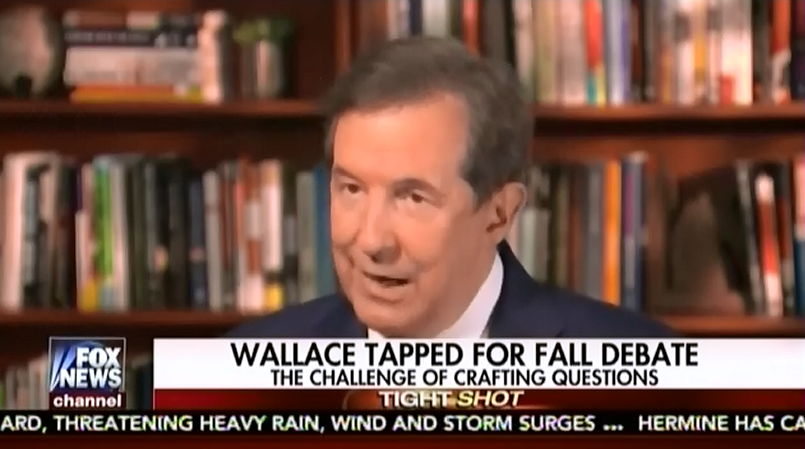
Fox News host Chris Wallace has said his role is to be “a timekeeper,” not a “truth squad” who fact-checks the candidates when he moderates the final presidential debate of this election on Wednesday. But that statement stands in stark contrast to Wallace’s previous effort to fact-check eventual Republican nominee Donald Trump while serving as a moderator of Fox News’ March Republican primary debate. Wallace even explained after that debate that because Trump frequently repeats the same lies, he had taken steps to ensure he could “fact-check him” “in real time.”
Shortly after Wallace was announced as the moderator of the final general election debate, Fox News host Howard Kurtz asked Wallace what he planned to do if the nominees “make assertions that you know are untrue.” Wallace replied, “That's not my job. I do not believe it is my job to be a truth squad. It's up to the other person to catch them on that.” He later added that such “truth squading” is “a step too far.” He reiterated during an October 16 interview that he believes the proper role of a moderator is to merely act as “a timekeeper,” not “a participant.”
That stance undeniably helps Trump, who has an unparalleled history of telling lies throughout the campaign. Indeed, Trump praised Wallace’s comments, saying, “I think the candidates should police themselves.”
Wallace’s assertion contradicts his performance as a co-moderator of the March 3 Fox News Republican primary debate. During one exchange with Trump over the candidate’s economic plan, Wallace repeatedly said that Trump’s “numbers don’t add up,” stated that Trump was incorrect to say that one of his proposals would cut the deficit by “hundreds of billions of dollars,” and explained to the candidate -- and the audience -- that it “doesn’t cut the federal deficit.” Wallace’s exchange with Trump relied on what Washington Post media reporter Callum Borchers called “instant, graphical fact-checks” and “full-screen graphics” that “cast serious doubt over the feasibility of Trump’s [economic] plans.”
Borchers praised Wallace for producing “a memorable TV moment that will likely have people talking about his fact-checks after the debate.” The Post’s Erik Wemple similarly wrote that the “revolutionary” fact-checking graphics forced Trump to “look at the data” without being able to spin the facts.
Wallace himself even noted the importance of fact-checking Trump after the March 3 debate. During a March 10 interview on Fox host Brian Kilmeade’s radio show, Wallace described the thinking behind the video fact checks, saying that “the only way you could catch [Trump] is in real time, in effect what the newspapers do the next day or the blogs do hours later, … fact-check him”:
BRIAN KILMEADE (HOST): You held his feet to the fire there, and it never added up.
[...]
CHRIS WALLACE: Here was the deal -- and I’m glad you liked it, I must say a lot of people did -- when you’re talking to Trump, he throws around a lot of numbers and you know, I thought, it was funny, there is a tremendous amount of planning that goes into these debates and I thought the only way you could catch him is in real time, in effect what the newspapers do the next day or the blogs do hours later, is fact-check him. There were about three or four things I knew he might say, like cut these departments, or we could negotiate a better deal on drugs, so I had these four full screens made up.
Chris Wallace is still moderating the debate. Donald Trump is still one of the candidates. The only difference between when Wallace thought fact-checking was vital and when he decided it was improper “truth squading” is that Trump’s opponent is no longer a group of Republicans, but Democratic nominee Hillary Clinton.
This debate may be the last chance a journalist has to ask questions of Trump before a national audience. But as Wallace’s own comments make clear, without vigorous, “real time” fact-checking, Trump will be able to lie to that audience with impunity.